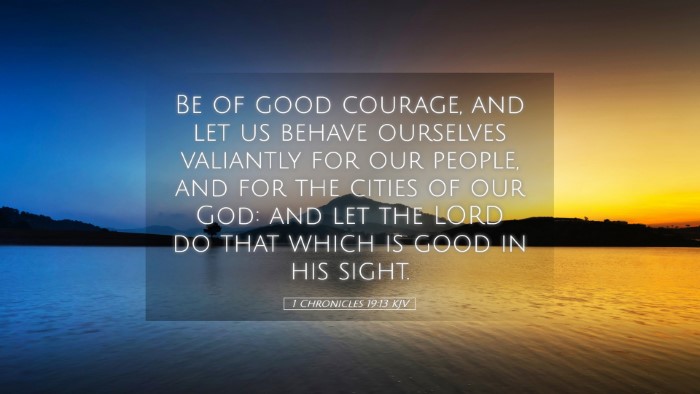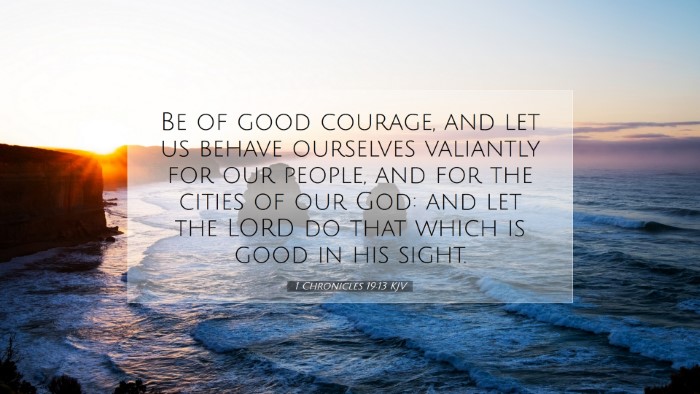Commentary on 1 Chronicles 19:13
Bible Verse: "Be of good courage, and let us behave ourselves valiantly for our people, and for the cities of our God: and let the Lord do that which is good in his sight." (1 Chronicles 19:13)
Overview
This verse encapsulates a significant moment in Israel's history. David’s armies are ready for battle, and the call for courage is paramount. The context involves an alliance with the Ammonites, a situation fraught with military and spiritual implications. The exhortation speaks to the hearts of the people, as the weight of their actions bears heavily on both their fate and their covenant with God.
Thematic Elements
- Courage and Valor: The imperative to “be of good courage” highlights the necessity of bravery in facing the trials ahead. Matthew Henry emphasizes the importance of inner strength, stating that true courage stems from reliance on God.
- Collective Responsibility: The phrase “for our people, and for the cities of our God” denotes the communal nature of their undertaking. Adam Clarke notes that the fight isn't merely for personal glory or safety, but for the preservation of Israel's identity and God's honor.
- Divine Sovereignty: The acknowledgment of God’s ultimate authority in “let the Lord do that which is good in his sight” provides a balanced perspective on human agency and divine will. Albert Barnes interprets this as a call to trust in God’s omnipotent plan regardless of the outcome.
Commentary Insights
Matthew Henry’s Perspective
Matthew Henry elaborates on the need for courage as essential to spiritual warfare. He asserts that such bravery should not be derived from mere human strength but through faith and reliance on God's providence. He urges believers to remember their identity as the people of God in their actions and decisions, which reflects a broader theme of loyalty and faithfulness amidst trials.
Albert Barnes’ Contributions
Albert Barnes emphasizes the significance of this moment as it relates to God’s judgment and the need for the Israelites to act in accordance with His laws. He interprets the call to courage as both a personal and collective challenge, urging the warriors to act valiantly while keeping in mind the larger cause of upholding God’s glory. He notes the democratic aspect of leadership; even kings rely on their subjects’ valor.
Adam Clarke’s Analysis
Adam Clarke stresses the importance of not only preparing for battle but conducting oneself with integrity and valor. He views the statement as a reminder of the spiritual battles believers face. Clarke goes further to interpret the phrase “let the Lord do that which is good in his sight” as a recognition that outcomes are in God’s hands, encouraging believers to submit their efforts to His wisdom and benevolence.
Practical Applications
- Encouragement for Leaders: Pastors and leaders in the community can use this verse as a foundational truth when inspiring their congregations to act with courage during difficult times.
- Community Engagement: This passage serves as a reminder for communities to act for the common good, acknowledging their roles in God’s kingdom and recognizing the weight of collective action.
- Trust in Divine Providence: The call to allow God to determine outcomes encourages believers today to trust in God’s plans over their understanding, fostering a reliance that can lead to deeper faith.
Conclusion
In conclusion, 1 Chronicles 19:13 is not merely an historical account but a truth that resonates through ages. It empowers the faithful to embrace courage, act for the glory of God, and rely on His perfect plan. The timeless insights from figures such as Matthew Henry, Albert Barnes, and Adam Clarke provide a rich tapestry of understanding that serves pastors, students, and scholars alike in their study and application of Scripture.


